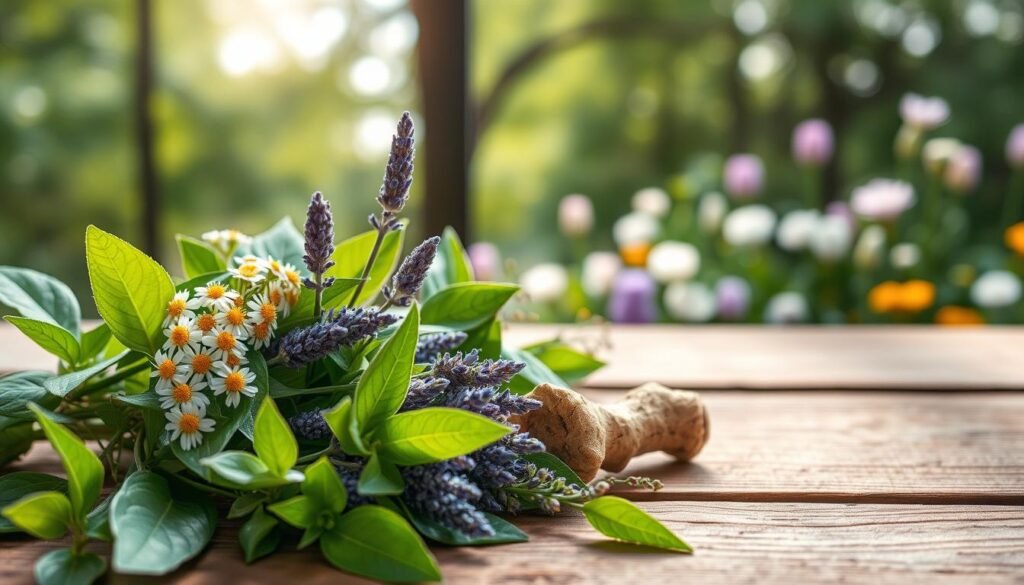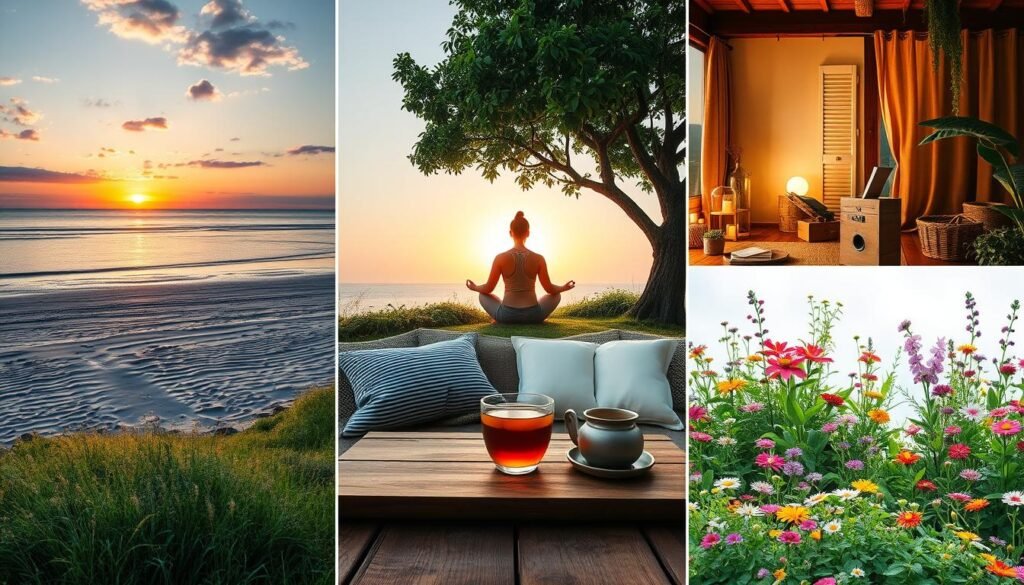In the United States, more than 19% of adults face anxiety disorders every year. This has led to a higher demand for Natural Alternatives to Prescription Anxiety Medications. People are now looking towards holistic ways to lessen anxiety. They are exploring methods that do not depend on drugs. These include herbal remedies and practicing mindfulness. Such alternatives show promising results and boost overall health.
This piece looks at various natural methods known to help reduce anxiety. It talks about using herbs like chamomile and lavender, and also about managing stress and changing what you eat. Though more and more people are trying these holistic approaches, it’s still important to talk to a doctor before changing how you treat anxiety. We still need more studies to truly understand the pros and cons of these natural choices. For extra information on herbal treatments, click this resource.
Key Takeaways
- Over 19% of adults in the U.S. experience anxiety disorders each year.
- Herbal remedies like chamomile may help reduce anxiety symptoms.
- Mindfulness practices can be effective in alleviating anxiety.
- Caution is advised when considering herbal supplements due to potential interactions with medications.
- Integration of physical activity into daily routines can significantly enhance mental health.
- Consulting a healthcare professional is essential prior to utilizing natural remedies.
Understanding Anxiety Disorders
About 40 million adults in the United States suffer from anxiety disorders. This is close to 18% of the adult population. These disorders are more severe and last longer than normal anxiety. They lead to persistent worry that greatly disrupts daily lives and mental health.
There are various types of anxiety disorders like generalized anxiety disorder, panic disorder, and phobias. Each one has its own challenges and symptoms, making accurate diagnosis key. People with anxiety often experience fear and avoidance. This can get worse over time and affect relationships.
It’s key to recognize the issues because there are many good treatments available. Many people are turning to Natural Anxiety Treatments as a different option. These include changing your diet and practicing mindfulness. It’s interesting how diet can play a part; too much caffeine and alcohol can make anxiety worse. Eating foods that are full of nutrients can help calm anxiety.
| Common Anxiety Disorders | Symptoms |
|---|---|
| Generalized Anxiety Disorder | Persistent worry, restlessness, fatigue |
| Panic Disorder | Recurrent panic attacks, rapid heartbeat, dizziness |
| Specific Phobias | Intense fear of specific objects or situations |
| Social Anxiety Disorder | Fear of social situations, avoidance behavior |
If you’re dealing with ongoing anxiety, it’s important to get professional help. Combining treatments like psychotherapy with Natural Anxiety Treatments can be very effective. Cognitive Behavioral Therapy is a great approach. It helps tackle the negative thoughts that fuel anxiety.
Symptoms of Anxiety
It’s important to know the symptoms of anxiety. This helps in identifying anxiety disorders and getting the right help. The common signs include:
- Constant worry: People often worry too much about daily things or what’s to come.
- Restlessness: Many feel they can’t calm down, always feeling edgy.
- Fatigue: It’s common to feel tired all the time, even after sleeping well.
- Difficulty concentrating: Focusing becomes hard, affecting work and decision-making.
- Physical symptoms: Anxiety can make your heart race, cause sweating, dizziness, and stomach troubles.
Knowing these symptoms can help people choose better treatments. Holistic anxiety relief is worth considering. It avoids the bad side effects of some medicines. In fact, certain anxiety meds can make dementia risk go up by more than 50%.
Activities like yoga and meditation have been shown to help. They lower anxiety and help find peace and stability inside.
Common Prescription Medications for Anxiety
Anxiety disorders are very common in the United States, affecting millions. Those with anxiety often look for relief in different ways. Common Prescription Medications for Anxiety are a key part of getting better. Benzodiazepines are famous but also controversial because they can be addictive. These drugs can make you feel too happy, leading to cravings and dependence.
Selective serotonin reuptake inhibitors (SSRIs) are often the go-to for treating many anxiety disorders. They help fix neurotransmitter issues that cause anxiety. SSRIs can take up to six weeks to start working, and stopping them might cause vertigo, nausea, and shock sensations.
Serotonin-norepinephrine reuptake inhibitors (SNRIs) are another choice. They are especially good for generalized anxiety disorder and panic disorder. There are also non-addictive options like Buspar® (Buspirone) and Vistaril® (Hydroxyzine). Buspar® goes after certain serotonin receptors, and Vistaril® works fast for short-term relief.
| Medication | Type | Onset of Action | Potential Side Effects |
|---|---|---|---|
| Benzodiazepines | Controlled Substance | Fast-acting | Addiction risk, euphoria |
| SSRIs | First-line Treatment | 2-6 weeks | Gastrointestinal issues, dizziness |
| SNRIs | Second-line Treatment | 2-6 weeks | Headaches, insomnia |
| Buspar® | Non-addictive | 1-2 weeks | Dizziness, nausea |
| Vistaril® | Non-addictive | Fast-acting | Sedation, dry mouth |
| Beta-blockers | Supportive Care | Fast-acting | Fatigue, low heart rate |
Besides medicine, changing your lifestyle and trying new things can also help. Methods like guided meditation and journaling have been useful. Knowing about these options helps people with anxiety make better choices for their health.
Natural Alternatives to Prescription Anxiety Medications
About 40 million Americans deal with anxiety. Many look for natural ways to manage it instead of medication. Options like herbal remedies, being mindful, and exercising offer a full approach to handle anxiety signs.
Herbal Remedies for Anxiety
Herbal solutions are key in fighting anxiety. For instance, using lavender oil can ease anxiety, sleep problems, and sadness. Studies have shown that taking 80 mg of lavender can help. Kava root also reduces anxiety without serious side effects, though headaches can happen sometimes. Chamomile is great for easing symptoms of severe anxiety, making you feel more relaxed.
Mindfulness for Anxiety
Mindfulness is getting recognized for helping with anxiety. A big review of 163 studies found it really does lessen anxiety symptoms. The Calm app’s success, with 100 million downloads and tons of high ratings, shows how many people are giving mindfulness a chance. Practices like meditating and writing down positive thoughts can help control emotions and manage anxiety daily.
Exercise and Physical Activity for Anxiety Relief
Working out is a strong cure for anxiety. Physical activity can quickly lower anxiety levels, especially right after exercise. Plus, adding magnesium to your diet helps calm your nerves, since not having enough magnesium is common. Making exercise a habit improves not just your body but your mind’s health too.

Herbal Remedies for Anxiety
Many are looking for natural ways to manage anxiety without prescription meds. Herbs like Kava, Chamomile, and Valerian Root have gained attention. They offer a possible escape for those dealing with anxiety.
Kava: Benefits and Risks
Kava is known for its ability to calm and improve mood. It’s a top pick for easing anxiety. However, it’s linked to liver damage, posing a significant risk. Consulting with a healthcare provider is crucial before trying Kava.
Chamomile: Soothing Properties
Chamomile is famous for its relaxing effects and may reduce anxiety levels. Studies suggest it can help with anxiety and improve sleep. Anyone on blood-thinners should be careful, though, due to possible drug interactions. Looking into herbal remedies for anxiety offers valuable knowledge.
Valerian Root and Its Potential Effects
Valerian Root is sought for its calming benefits. Some research supports its use for anxiety and relaxation, but results vary. Awareness of possible side effects like sleepiness and stomach issues is key. Consulting a professional for advice is advised. Becoming informed about herbal anxiety solutions is a good initial step.
Mindfulness and Meditation Techniques
About 40 million American adults suffer from anxiety. Luckily, many find relief in natural anxiety treatments without medication. Mindfulness has become popular for its simple yet effective methods.
Meditation has been practiced for thousands of years for relaxation and stress reduction. It includes mindfulness meditation, guided meditation, and mindful movement like yoga and Tai Chi. These focus on inner peace and emotional stability. Studies show they help manage anxiety symptoms well.
Adding mindfulness to daily life can improve heart rate, lower blood pressure, and better sleep. Being present increases self-awareness and patience. Regular meditation boosts creativity and helps control emotions. This makes it a complete mental wellness tool.

Studies show that nature also reduces anxiety. Being outdoors aids mental health significantly. Meditation or simple walks in nature can ease stress and anxiety.
| Meditation Type | Description | Benefits |
|---|---|---|
| Mindfulness Meditation | Focuses on being present and aware of thoughts and feelings without judgment. | Enhances self-awareness, lowers anxiety levels. |
| Guided Meditation | Involves following a relaxation script or audio guide. | Reduces stress, promotes tranquility. |
| Yoga | Combines physical postures, breathing techniques, and meditation. | Improves flexibility, reduces tension and anxiety. |
| Tai Chi | A gentle form of martial arts focusing on slow movements and deep breathing. | Enhances mental clarity, promotes relaxation. |
| Qigong | A holistic practice combining physical postures with meditation. | Improves mental clarity, reduces stress levels. |
Integrating these practices into life can greatly help with anxiety. Using mindfulness lets people take control of their mental health naturally.
Dietary Changes for Anxiety Management
Nutrition is key in controlling anxiety symptoms. Adjusting what you eat can boost mental health. This enhances the benefits of therapy and medication. People with anxiety might see improvements by changing their diet.
Eating enough omega-3 fatty acids is crucial. Try to eat fatty fish like salmon or sardines twice a week. This can lower anxiety levels. Research shows that omega-3s help in easing anxiety symptoms.
Foods high in vitamin D also improve mood. Not getting enough vitamin D can worsen anxiety. So, include foods like salmon in your diet. Eggs are also good. They have protein and tryptophan, building blocks for serotonin. This can boost brain function and reduce anxiety.
Adding pumpkin seeds to your diet helps. They have potassium and zinc. These minerals manage cortisol and support brain health. Dark chocolate is another great option. It provides flavonoids and magnesium, which reduce stress and enhance mood.
Turmeric, with its active part curcumin, can lessen anxiety. It fights inflammation and oxidative stress. Chamomile tea or extract also offers benefits. It’s packed with flavonoids, reducing anxiety symptoms.
Yogurt full of probiotics improves mental health by fighting inflammation. Green tea has calming effects, thanks to L-theanine. It aids in relaxation and serotonin production. This decreases stress.
Eating Brazil nuts, which are rich in selenium, boosts mood. A diet with a mix of whole grains, fruits, and veggies promotes mental health. Making these diet changes can lead to a healthier mind and better emotional balance.
Stress Management Techniques
Managing stress is key to keeping your mind healthy. Stress Management Techniques can really help lower anxiety and make life better. Things like deep breathing, yoga, and tai chi are great because they’re simple and everyone can do them.
Deep Breathing Exercises
Deep breathing is a powerful way to calm down and feel relaxed. By focusing on deep breaths, you can get more oxygen and help your body relax. This includes exercises like the 4-7-8 method. They’re great for feeling better emotionally and doing better in sports and other activities. Adding these to your daily life helps with stress and keeps you present. To learn more about how breathing can help with workouts and stress, check out this link.
Yoga and Tai Chi for Stress Relief
Yoga and tai chi are about moving and breathing in a mindful way. They help reduce stress hormones, lower your blood pressure, and lift your mood. Studies show yoga really helps with anxiety more than other exercises. Tai chi’s gentle movements and deep breathing can also soothe your mind and body. Doing these regularly not only keeps you fit but also clears your mind, proving they’re powerful against stress.

| Technique | Benefits |
|---|---|
| Deep Breathing Exercises | Restores calm, enhances emotional well-being, improves athletic performance. |
| Yoga | Reduces cortisol levels, lowers blood pressure, enhances mood, effective against anxiety. |
| Tai Chi | Promotes relaxation, improves mental clarity, reduces stress through mindful movement. |
Supplements That May Help Alleviate Anxiety
Dietary supplements offer a promising way to ease anxiety naturally. This section looks at options like Ashwagandha and CBD Oil. They are popular for their potential benefits.
Ashwagandha and Its Adaptogenic Properties
Ashwagandha is an adaptogenic herb that helps the body handle stress. Studies show it may lower cortisol levels, improving mental health. Regular use could enhance resilience to stress, aiding those with anxiety.
While many have felt better using it, more research is needed. This will confirm its safety and effectiveness over time.
CBD Oil: A Natural Option
CBD Oil is gaining attention as a natural anxiety remedy. It comes from cannabis but doesn’t make you feel high like THC does. Studies suggest CBD may reduce anxiety symptoms. Thus, it’s a top choice for those looking for natural anxiety supplements.
There are many CBD products out there. Users can find ones that fit their needs best.
Looking for other natural treatments? Consider magnesium, omega-3 fatty acids, and B vitamins. They also show promise in managing anxiety better. For more information, check out this link. It offers insights into holistic alternatives.
Conclusion
Exploring natural ways to handle anxiety offers many options. About 40 million adults in the U.S. are affected by anxiety disorders. For some, herbal remedies, mindfulness, and changing their diet can be effective.
It’s important to know that not all natural remedies work for everyone. Anxiety is different for each person. So, choosing natural methods should be done carefully. Talk to a health care provider to make sure your choices are safe and right for you.
Finding the best way to manage anxiety often includes therapy and changing your lifestyle. When natural methods are added under a professional’s advice, they can help. This balanced approach can lead to better mental health and overall happiness.